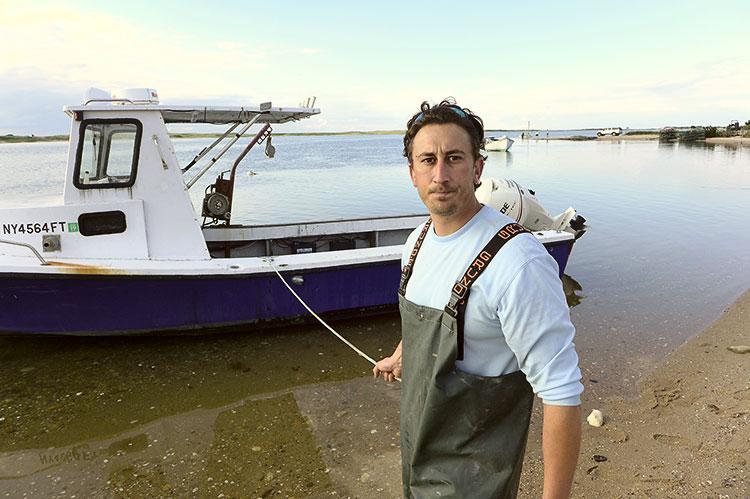Oyster farmers denounced efforts to restrict their activities in Gardiner's and Peconic Bays and boaters pressed their complaints that the floating gear some farmers use presents a hazard to navigation and an aesthetic nuisance when the Suffolk County Shellfish Aquaculture Lease Program's 10-year review board met on Friday.
Callers to the virtual meeting were roughly split in encouraging or criticizing the aquaculture lease program, proponents touting the environmental benefits of oysters and contrasting that with recreational boating activity, pointedly including yacht club officials and members.
"We are a contributor, positively, to the health of the bay," said Bert Waife of Shelter Island. "The longer and more we work our lease, the greater the contribution we're making. . . . I want to say also that we're not discharging into the water, we're helping clean it."
Oysters are filter-feeding shellfish that help remove excess nitrogen from the water, and proponents of shellfish cultivation argue that the practice is important in mitigating harmful algal blooms. The leasing of bottomlands has proved controversial in East Hampton, however, with the Devon Yacht Club in Amagansett claiming that floating cages interfered with boating activities. A lawsuit filed by the club was later settled.
Aquaculture is "the only industry that has a net environmental benefit to the estuary," said Karen Rivara, a Southold oyster farmer.
Those objecting to gear in waters "need to take a look at the amount of moorings you have at your yacht club," said Jason Masters. "Those moorings, compared to gear out there that's providing filtration, that's improving our environment, far surpasses the recreational benefit the individual receives compared to the community aspect of this program."
"To say the county has been ignoring users is completely false," said Adam Younes of Promised Land Mariculture Company, who has a lease site in Gardiner's Bay. "Unfortunately, I happen to be next to a very obnoxious yacht club."
But Curt Schade, the Devon Yacht Club's commodore, said to "everyone who felt yacht clubs want to take water for their exclusive use, it's quite the contrary. We're not opposed to aquaculture, nor floating gear. It's just about location."
The aquaculture program, SCALP for short, was established in 2004 after New York State ceded title to some 100,000 acres of bottomland to the county for an aquaculture lease program. Under the program, 10-acre parcels in Peconic and Gardiner's Bays have been leased for private commercial shellfish farming since 2010. The 10-year review is required to determine if and how the program should be changed and implemented for the next decade, and includes an overall evaluation of it to date.
The present draft of an update to the program maintains a limit of 60 acres of new bottomland leases per year over the program's next 10 years. The County Legislature continued to accept comment after its Dec. 15 public hearing on the program's 10-year review ended without a vote on proposed changes. On Friday, Sarah Lansdale, director of the county's Division of Planning and Environment, said that she plans to introduce amendments on or around Monday in advance of a Feb. 2 meeting. If the public hearing is closed on Feb. 2, proposed legislation updating the program would go to the Legislature's Environment, Parks, and Agriculture Committee on Feb. 22. Should it advance from there, the full Legislature will consider it on March 2.
"There will likely be some amendments around the composition of the aquaculture lease board," which conducts public meetings, "to expand representation for East End towns," Ms. Lansdale said on Friday. This, some speakers said, would be a positive development, one that might preempt future conflicts between user groups.
Members of the aquaculture lease board agreed that it has been inclusive, allowing all user groups an opportunity to make their views known. But Rod Richardson of Amagansett disagreed, calling the review process "a joke" that was ignoring conflicts among user groups. "For all the talk of being inclusive, you're not inclusive if you ignore the advice of hundreds and thousands of people, locals who have all said that floating gear is a big problem," he said. "You need to regulate it, you can't blockade the surface of the waters."
Shellfish farming gear conflicting with other user groups, including commercial fishermen, is "a huge issue," agreed Bonnie Brady, executive director of the Long Island Commercial Fishing Association. Mr. Richardson suggested that towns be given veto power over placement of lease sites in their respective waters.
Chuck Westfall, a member of the review board, pushed back on those charges. "It seems like we keep starting from ground zero," he said. "We have 10 years of aquaculture being there in Peconic and Gardiner's Bays. At present, you have approximately 50 of these sites deployed, and of that approximately 30 are being used to some level. Of that, approxi-mately four or five are using floating gear to some level. These figures are minuscule. We also have a history of no conflicts" between shellfish farmers and commercial or recreational boaters. "If we extrapolate these data points out to the future, it's reasonable to believe we're going to have very few, or no, conflicts in the future."
But, he agreed, potential conflicts such as that between the Devon Yacht Club and lease sites near it could be averted with greater representation from the East End on the review board. Nonetheless, "We have data points. I'm frankly tired of people saying 'This could happen and this could happen.' Yes, we all realize things can happen."




